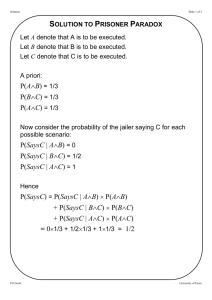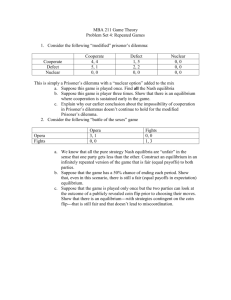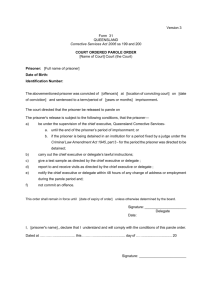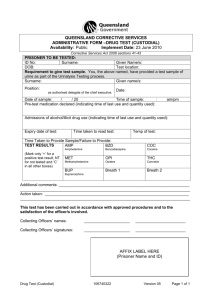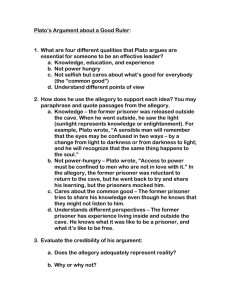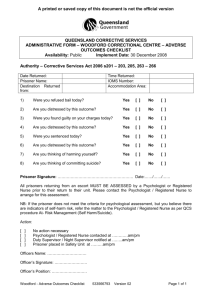13-4022
advertisement
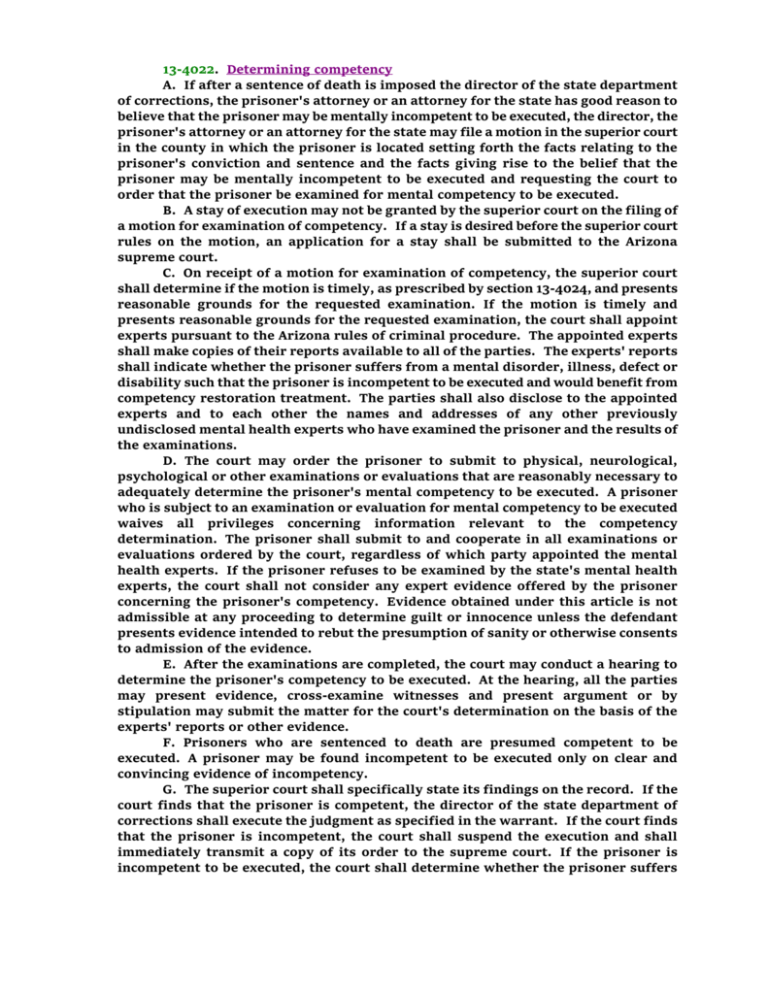
13-4022. Determining competency A. If after a sentence of death is imposed the director of the state department of corrections, the prisoner's attorney or an attorney for the state has good reason to believe that the prisoner may be mentally incompetent to be executed, the director, the prisoner's attorney or an attorney for the state may file a motion in the superior court in the county in which the prisoner is located setting forth the facts relating to the prisoner's conviction and sentence and the facts giving rise to the belief that the prisoner may be mentally incompetent to be executed and requesting the court to order that the prisoner be examined for mental competency to be executed. B. A stay of execution may not be granted by the superior court on the filing of a motion for examination of competency. If a stay is desired before the superior court rules on the motion, an application for a stay shall be submitted to the Arizona supreme court. C. On receipt of a motion for examination of competency, the superior court shall determine if the motion is timely, as prescribed by section 13-4024, and presents reasonable grounds for the requested examination. If the motion is timely and presents reasonable grounds for the requested examination, the court shall appoint experts pursuant to the Arizona rules of criminal procedure. The appointed experts shall make copies of their reports available to all of the parties. The experts' reports shall indicate whether the prisoner suffers from a mental disorder, illness, defect or disability such that the prisoner is incompetent to be executed and would benefit from competency restoration treatment. The parties shall also disclose to the appointed experts and to each other the names and addresses of any other previously undisclosed mental health experts who have examined the prisoner and the results of the examinations. D. The court may order the prisoner to submit to physical, neurological, psychological or other examinations or evaluations that are reasonably necessary to adequately determine the prisoner's mental competency to be executed. A prisoner who is subject to an examination or evaluation for mental competency to be executed waives all privileges concerning information relevant to the competency determination. The prisoner shall submit to and cooperate in all examinations or evaluations ordered by the court, regardless of which party appointed the mental health experts. If the prisoner refuses to be examined by the state's mental health experts, the court shall not consider any expert evidence offered by the prisoner concerning the prisoner's competency. Evidence obtained under this article is not admissible at any proceeding to determine guilt or innocence unless the defendant presents evidence intended to rebut the presumption of sanity or otherwise consents to admission of the evidence. E. After the examinations are completed, the court may conduct a hearing to determine the prisoner's competency to be executed. At the hearing, all the parties may present evidence, cross-examine witnesses and present argument or by stipulation may submit the matter for the court's determination on the basis of the experts' reports or other evidence. F. Prisoners who are sentenced to death are presumed competent to be executed. A prisoner may be found incompetent to be executed only on clear and convincing evidence of incompetency. G. The superior court shall specifically state its findings on the record. If the court finds that the prisoner is competent, the director of the state department of corrections shall execute the judgment as specified in the warrant. If the court finds that the prisoner is incompetent, the court shall suspend the execution and shall immediately transmit a copy of its order to the supreme court. If the prisoner is incompetent to be executed, the court shall determine whether the prisoner suffers from a mental disorder, illness, defect or disability and shall order competency restoration treatment. The prisoner shall remain in the custody of the state department of corrections until the time for review has expired or a supreme court review is completed. If no review is sought or the supreme court upholds the finding of incompetency to be executed, the director of the state department of corrections shall transfer the prisoner to a licensed behavioral health or mental health inpatient treatment facility operated by the state department of corrections for competency restoration treatment. The prisoner shall remain confined in the licensed behavioral health or mental health inpatient treatment facility operated by the state department of corrections until the prisoner becomes competent to be executed. H. Pursuant to subsection G of this section, the department of health services shall provide competency restoration treatment, including prescribing medication, to a prisoner found incompetent to be executed. The person who supervises the treatment of a prisoner found incompetent to be executed shall submit a written report to the court, the attorney general and the prisoner's attorney when the person believes the prisoner is competent to be executed. The written report shall include at least the following information: 1. The name of each mental health expert who examines the prisoner. 2. The description of the nature, content, extent and results of the examination and any tests conducted. 3. The facts on which the findings are based. 4. An opinion as to the prisoner's competency to be executed. I. Within five days after the superior court grants or denies a motion for examination or rules whether the prisoner is competent, a party may file with the Arizona supreme court a petition for special action to obtain review of the superior court's decision. J. The clerk of the court shall prepare a statement of the costs incurred by the county. The judge shall certify the statement and shall forward it to the governor for approval. After approval, the governor shall order that the costs be paid to the county treasurer in the county in which the hearing was held from monies appropriated to the state department of corrections. -2-
